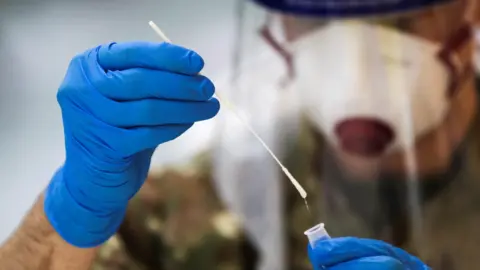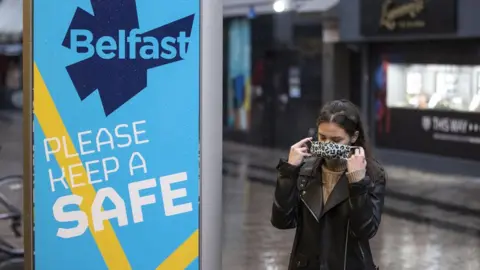Covid-19: Tests to show whether Eris variant is in NI
 Reuters
ReutersHealth officials are waiting to hear whether a "small number" of people in Northern Ireland have tested positive for the new variant of Covid-19.
Eris is a descendant of Omicron and has been in the news amid a rise in Covid cases, especially in England.
The results of the tests in Northern Ireland are expected within a few days.
The Public Health Agency said there was no evidence of any changes that have resulted in increased transmissibility of the virus or more serious infection.
It told BBC News NI that while there had been an increase in the number of cases and people admitted to hospital due to Covid-19 in recent weeks those remained "at relatively low levels".
There has been a spike in the number of new Covid cases internationally, particularly in Asia.
Eris was classified as a variant in the UK on 31 July but not as a variant of concern.
It is estimated that one in seven positive cases are the Eris variant, making it the second most prevalent variant in the UK.
The World Health Organization (WHO) started tracking the EG>5.1 variant more than two weeks ago when a sudden rise in the number of people testing positive caused concern.
The Public Health Agency said that the Sars-COV-2 virus which causes Covid-19 is "still in circulation and is constantly evolving, with new variants arising frequently".
"Some of these can become dominant and could cause further waves of infection," said the agency.
With summer holidays and an increase in travel, a spike in cases is expected.
However with no official testing or recording of results, tracking the spread of the virus across the population and by different age groups is more difficult.
A report published by the UK Health Security Agency (UKHSA) on 3 August stated that the number of Covid-19 cases continued to rise compared with the results from the previous two weeks.
 PA Media
PA MediaThe Public Health Agency said that vaccines were the best defence against Covid-19 and several other respiratory infections such as flu.
It said that the vaccines provided "good protection against hospitalisation and death and reduce the risk of long-term symptoms and spread to others".
GPs are expecting to hear shortly which at risk groups will be invited to receive their Covid and flu jabs.
WHO director general Tedros Adhanom Ghebreyesus recently said that "countries should not let down their guard" even though people were better protected by vaccines and prior infection.
"WHO continues to advise people at high risk to wear a mask in crowded places, to get boosters when recommended and to ensure adequate ventilation indoors," he said.
"We urge governments to maintain and not dismantle the systems they built for Covid-19."
